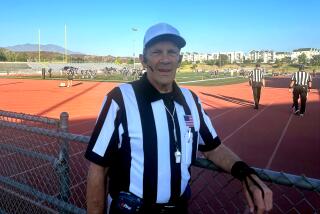Blowing the Whistle
- Share via
On the eve of the Women’s World Cup, coaches from Australia to the United States and from Brazil to Denmark are focused on the key figures in the tournament.
U.S. forward Mia Hamm? Defender Linda Medalen of Norway? Chinese goalkeeper Gao Hong?
No. Try Fatou Gaye of Senegal and Jackeline Saez of Panama.
Never heard of them? That’s because Gaye and Saez aren’t players, they’re referees.
And they’re women, as are all 31 officials for World Cup ‘99, which begins today.
And that has many coaches hopping mad. Not because only women will be wielding the whistles and flags but because so many of them are so poorly qualified to do so.
This will be the first major international competition to be officiated entirely by women.
Once again, the coaches claim, common sense has given way to political correctness and ill-conceived experimentation.
“I am concerned about the refereeing this summer because I think there are going to be some very good ones, but there are going to be some who are not ready to referee at a world-class level,” U.S. Coach Tony DiCicco said.
“And I don’t think it’s fair to the players. . . . We need the best officials here and not just the best female officials.”
If all the officials chosen for World Cup ’99 were of the caliber of Norwegian referee Bente Skogvang, the woman who had charge of the 1996 Olympic Games women’s final between the United States and China, there would be little complaint.
Nor would there be much dissent if the referees’ skills and experience matched those of Canada’s Sonia Denoncourt, who is one of the 31 and who is said to be the favorite to officiate the championship game at the Rose Bowl on July 10.
But they are not.
Instead, geographic fairness--FIFA feels it is politically incorrect to snub an entire continent--has come into play and the tournament will feature referees from such women’s soccer nonentities as Senegal and Panama.
If it all goes horribly wrong--and the coaches feel sure it will--the blame can be placed directly at the polished shoes of Joseph “Sepp” Blatter, the president of FIFA. It was his suggestion that World Cup ’99 be officiated only by women and, in November, the FIFA referees’ committee rubber-stamped the proposal.
“One cannot say that because a referee is coming from a country where football is not at the highest possible level that a referee from that country, himself or herself, is not of a high level,” Blatter said in February. “It is not only a matter of experience but of talent. . . .
“There is a long way to go to bring women referees to the high international level where women’s football is already at.”
Which would seem to be an admission that the top players are far ahead of most referees in their ability to read the game and react--precisely the argument the coaches are making.
But Blatter views the women’s game differently than the men’s.
“Women do not cheat in football,” he said. “I tell you, that’s true. It’s true. Statistics show that they don’t cheat. They don’t grip the shirt [to restrain opponents], they don’t feign injury.”
Coaches say the women’s game can be just as hard as the men’s. In the intensity of competition at the World Cup level, gamesmanship most certainly will come into play, whether it’s subtle time-wasting or the intentional trip disguised as being accidental.
The question is, will all 31 officials be able to spot the fouls and react appropriately? Or will some fail in their duty at a crucial moment in a key game and thereby alter the entire course of the competition?
That, more than anything, is what worries the coaches.
There are bound to be bad calls in this 16-nation, 32-game tournament. There are in every World Cup, men’s or women’s.
But an inexperienced and naive officiating crew can make matters far worse.
“It’s been a concern for a long time,” Australia Coach Gregg Brown said. “I remember in the last World Cup [in Sweden in ‘95, when there was a mix of male and female game officials], the Australian coach there thought we were giving in to equality and getting rid of quality.
“You’ve got to be good enough, I don’t care what sex you are. Male or female, it doesn’t bother me. As long as the quality is there.
“Maybe they [FIFA] are thinking that women’s soccer is still in a backwater. But it’s obvious that it’s not. We’ve got quality professional players here, who know the rules, who are very competitive. They want to win and they want a good game.
“It’s very frustrating when decisions go against you when both teams realize it’s the wrong decision and the referee is making mistakes time and time again.”
The Algarve Cup tournament in Portugal in March attracted some of the world’s best teams and finest female officials, yet there were controversies aplenty.
Why else was Sweden Coach Marika Domanski Lyfors yelling herself hoarse on the sideline at every game? Why else was Denmark Coach Jorgen Hvidemose stunned when a bad call robbed his team of a victory over world champion Norway?
“We have been trying to beat them for eight years,” a shaken Hvidemose said, still not believing that what appeared to be a perfectly legitimate goal had been disallowed.
More to Read
Go beyond the scoreboard
Get the latest on L.A.'s teams in the daily Sports Report newsletter.
You may occasionally receive promotional content from the Los Angeles Times.






